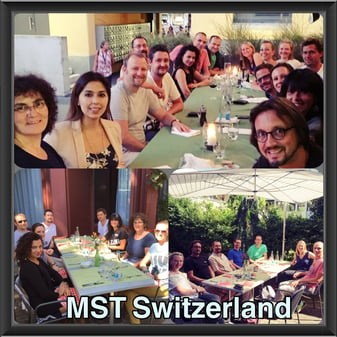MST is a Global Model
Switzerland, a country currently implementing MST, has one of the highest percentages of foreigners in its population with the majority of them being from Europe. In addition, Switzerland has 26 counties that work very independently from each other, from political ideas to economics structures. Given geographic and cultural differences, just how effective is a model like Multisystemic Therapy, when implemented internationally?
A Swiss MST Therapist's Experience
As an immigrant originally from Germany who moved to Switzerland in 2011, I had some specific beliefs in mind before I got there. “It is a really small country,” “Everything is neat,” “You find the best cheese there,” “Trains are always punctual,” “There are lots of banks,” and so on. I was also aware of some of the facts: Switzerland has 4 language areas, an overall population of approximately 8 million people, including one of the highest percentages of foreigners: about 35% of the population has a migration background dating back several hundreds of years. Interestingly, Switzerland's diversity means its 26 diverse counties work very independently from each other, from political ideas to economics structures.
MST Comes to Switzerland

Multisystemic Therapy (MST) was first implemented in Switzerland almost 11 years ago, first with a standard MST team and a child abuse and neglect (MST-CAN) team in one county: Thurgau. Since then, two more counties have implemented MST teams: Aargau, with a standard MST team, and Basel, with a standard team as well as an MST-CAN team. I have had the privilege of working in Aargau as an MST therapist for almost 5 years, and as an MST supervisor for a year. I can safely say that all of the Swiss cliches mentioned above are mostly true, with the occasional exception to the rule (except for the awesome cheese-this is always a safe bet). But, aside from the cliches, what makes Switzerland a fascinating example of MST's international presence?
Experiencing Social Layers
Being a home-based therapist within the MST model, you get to experience almost all the social layers of this country firsthand. Despite a common thought that most people in Switzerland have a lot of money, there is in fact a wide range of incomes, and as all of us have experienced, conduct disorder knows no socio-economic status. Due to the small size of the country, there is also big overlap between rural areas and bigger cities, with a very high population density even in countrified spaces. There are days as a therapist where you might meet a family on a big farm with lots of animals in the morning, then have a short drive (if you are lucky enough not to get stuck behind an agricultural vehicle) to a family living in a small social flat in a suburb, after which you could meet a family in a town center where the members present the attitude of urban dwellers. It is amazing how heterogeneous the society in Switzerland is, with everything being so close together. And if things become stressful, there is nothing better than having a break between family visits, sitting in your car beside a lake, watching the beautiful landscape with the mountains in the background and eating a fresh, delicious cheese (of course!) sandwich, while reflecting upon your systemic work.
Understanding and Appreciating Cultural Differences
As a clinician, it is an ongoing task to understand and engage each of these different families again and again, finding a balance of using the generalized, structured concept of MST in such a heterogeneous family environment. For us, this is accomplished by ensuring that we take the time to understand and have a true appreciation for the cultural differences and how they may influence and/or shape the treatment approach with our families. At the same time, it is even more satisfying if applying a common tool shows the same positive effect over a wide range of different family systems.
We are constantly faced with the challenge of adapting the American concept to the Swiss culture, environment, health services, school structures, and so on. Constantly trying to figure out the overlaps and gaps in this area, together with our consultant from the states and other supervisors, continues to be a highly beneficial learning experience for all of us.
Implementing MST in Switzerland
The most effective approach to incorporate the MST concept into the Swiss culture is to first ensure that we view the model as multi-directional and that it is adaptive to any culture. We remind ourselves that MST is a synthesis of various therapeutic modalities that impact internal and external change. This is done through supervision and consultation by helping clinicians to examine each case through a systems approach and remembering the impact that each system has on the other. We are then able to explore interventions that are specific to understanding social and cultural variations that shape the presenting behavior that target in treatment for all systems connected to the family.
We receive cases in which families have immigrated to Switzerland from multiple countries (Germany, France, Italy, United Kingdom, India, Turkey, Iraq, Ukraine, Egypt, etc.) who are demonstrating antisocial behaviors. Our teams are steadfast in exploring factors that may lead to the above-mentioned behaviors, working with the multiple systems that are connected to the families, and influencing positive change. This is no different than the implementation of MST in the United States, Chile, or Australia, with families that migrate to their countries.
MST’s focus on engagement and understanding is a paramount factor in its treatment model. Our teams are dedicated to providing a comfortable sense of acceptance to the families, while creating culturally-sensitive therapeutic interventions that do not infringe on their diverse values. With this approach, we find that MST is a model that addresses antisocial behaviors across geographic and social lines. It is possible to look at strengths within and between cultures and embrace those differences while partnering with them to promote lasting change.
Interested in starting an MST program in your community?



